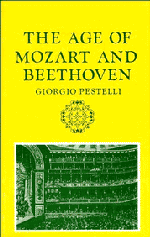IV - BEETHOVEN
Published online by Cambridge University Press: 10 November 2010
Summary
The transformation in musical life at the end of the eighteenth century
In few other periods has the social world of music suddenly undergone such vast and radical changes as it did in the years 1770–1820. The life of a musician in 1810 was more like that of one of his present-day colleagues than the life of a maestro di cappella in 1760. The present circle for the production and diffusion of music is still largely that bequeathed by the final decades of the eighteenth century, when the industrial revolution and the bourgeoisie under the leadership of the state changed the face of the greater part of the countries of Europe.
The period's great social changes mainly involved, in the musical field, the replacement of the maestro di cappella with the independent professional musician. The old maestro di cappella, like other salaried persons in the service of a gentleman or a council, was a servant of greater or lesser rank depending on his patron's inclination or on the fame that he himself enjoyed. In any case he had a series of stipulated duties: to compose or direct performances of every type of music required by the public or private life of the chapel or municipality; to enforce discipline and see to the good behaviour of the musical personnel; and to buy instruments, to check that they were working properly, and to supervise the musical library.
- Type
- Chapter
- Information
- The Age of Mozart and Beethoven , pp. 167 - 260Publisher: Cambridge University PressPrint publication year: 1984



